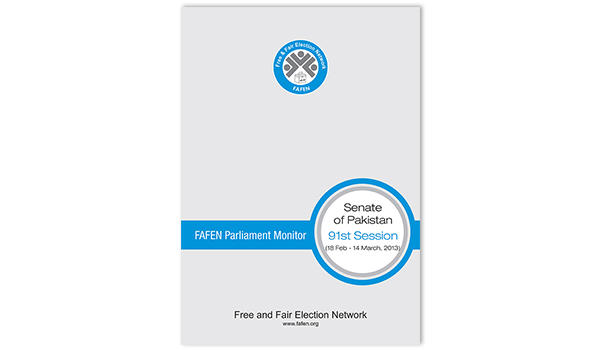Senate’s 91st session witnessed the passage of 24th constitutional amendment bill calling for creating another province out of the Punjab besides amending the anti-terrorism law twice and giving go ahead to a bill on setting up an authority to counter terrorism.
The session from 18 February to 14 March 2013 lasted 36 hours and 14 minutes. On average, each of the 17 sittings lasted two hours and seven minutes, starting 49 minutes late. Overall the upper house passed 15 bills including four private members’ bills. A private member’s bill introduced by the Leader of the Opposition in the Senate “to consolidate the law to regulate the acceptance and utilization of foreign contribution” by NGOs “for any activities detrimental to the national interest” was referred to the Standing Committee on Finance.
Out of the total 15 bills passed during the session, six were related to education including three private members’ bills seeking establishment of two universities in Islamabad and one in Lahore. Additionally, a government bill was passed to set up the Capital University of Science and Technology in Islamabad.
The upper house also passed a bill to grant degree awarding status to Pakistan Institute of Medical Sciences by upgrading it to a medical university as the Shaheed Zulfiqar Ali Bhutto Medical University (PIMS), Islamabad. The house also passed a bill to establish an authority to register and regulate the private educational institutions.
Amid protest by the opposition parties PMLN and NP, the house passed the bill demanding a new Bahawalpur Janoobi Punjab province in southern Punjab. The upper house twice amended the Anti-Terrorism Act 1997 to give more powers to the law enforcing agencies to curb terrorism besides passing a bill to set up National Counter Terrorism Authority.
Two private members’ bills by a PMLN legislator on abolishing discretionary quotas in the public housing schemes and exempting electoral candidates from personally appearing before returning officers at the time of filing nomination papers for general elections were also passed. The amendment in the Representation of Peoples Act 1976 omits an article decreed by the military president to prevent the party heads of the PPPP and PMLN from contesting the elections in 2002. According to the supplementary bill’s statement, the military ruler amended the Representation Act through an ordinance to “prevent the leaders of the major political parties, who were abroad at the time, from filing nomination papers.”
The house addressed 59% agenda – 72 of 122 items – listed on the orders of the day. The agenda for the private members’ day was ambitiously set as 71% (22 items) remained unaddressed. Additionally three adjournment and privilege motions each, a report and a resolution appeared on supplementary agenda. Apart from passing 15 bills, the house adopted three resolutions, debated four calling attention notices, a motion each under the rules 218 and 60, and three privilege motions. Ten standing committee reports were laid before the house.
For complete report click here









